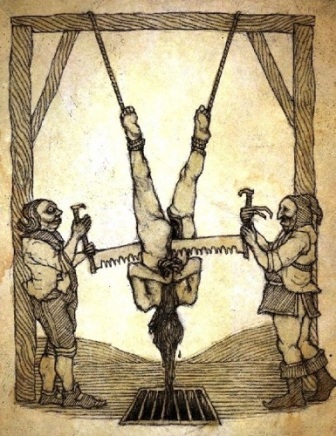Recent conversations bring me back to this truth: The scandal of the Cross is that it is not the narrative of (divine) withdrawal that many make it out to be. I’m convinced the time has come to withdrawal from all talk of divine withdrawal, to abandon all talk of divine abandonment, and to forsake the myth of godforsakenness.
“The Cross is a narrative of approach, of nearness, of presence. It is where God, in the full simplicity of triune love, insists upon being with us, thus judging (viz., rendering) all narratives of divine withdrawal, from within the circumstances that create those narratives, to be myths and fabrications of despair and dereliction. The real ‘cry of dereliction’ (as theologians have named it) is not that cry Jesus utters on the Cross (“My God, My God! Why?”). On the contrary, the real cry of dereliction is ours: “Crucify him!” There is the only despair and dereliction connected to the Cross, the dereliction that hangs Jesus on it, while the only real sanity in view is Jesus’ confidence in the Father’s love. The dereliction is heard in a thousand other cries – cries that give up altogether, but also cries that scream their despair all the louder. Much of our despairing dereliction gets published as Christian theology.”
 Why the gruesome picture? Because sometimes theology gets in the way.
Why the gruesome picture? Because sometimes theology gets in the way.
I continue to contemplate the crucifixion. Where was God? What was he up to? What was his part in this? What happened there that day which God gives to faith to perceive that so radically transforms the world? God-talk these days is full of references to ‘divine withdrawal’, and to the Cross as the quintessential manifestation of divine withdrawal. I’d like to reflect here a bit upon that idea.
• If we understand God to be inseparably present to creation (as its creator and sustainer – a fairly unobjectionable reading of Scripture), then talk of God “withdrawing” from can only be a figurative expression for the phenomenological aspects of our suffering. We experience ourselves and the world in ways we explain by removing God from the scene. If God were “here,” here would be different that it is, so…
View original post 546 more words
Agreed.
But it works only IF the condemned is indeed God in the flesh.
LikeLike
Yes, certainly.
LikeLike
If one entertains notions of divinity absent from Jesus (whether an absence wholly or in part, temporarily or metaphysically; or alternatively posing an opposition between the human and the divine) then speaking of the “withdrawal of God” is not so unreasonable.
LikeLike
Hi Robert. Not sure I’m following ya. Are you saying that where people have understandings of God that are compatible with God’s ‘withdrawing’, then saying God ‘withdraws’ makes sense? I agree, but that doesn’t seem to be saying much. Of course if one has a view of God that allows for such withdrawal, then it makes sense for one to say God withdraws. I’m suggesting such views are problematic.
LikeLiked by 1 person
Sorry for not being clearer. My contention is that at the center of “withdrawal theologies” are problematic Christological construals – problems which do no hold up against, or run counter to, the affirmations of the fourth ecumenical council.
I am just anchoring your observation in historical theology.
LikeLiked by 1 person
And I may add, that (hence) for those adhering to ancient understandings of Christology, the cross of dereliction is not seen as a withdrawal of God – exactly and paradoxically the opposite – as you too affirm – it is God at its closest to us, the very Emmanuel! A true scandal, in more than one way – the innocent condemned; God in the flesh, the Creator become his creature; Life itself hung to die; the Emmanuel cast aside.
LikeLiked by 1 person
cast aside by us, not by God
LikeLike